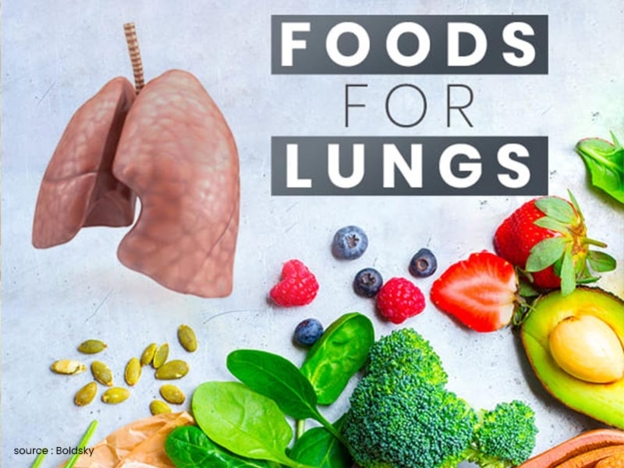|
Kenneth Davis

T H O U G H T F O R C O N S I D E R A T I O N
A 'treat' is different from a 'reward,' which must be justified or earned. A treat is a small pleasure or indulgence that we give to ourselves just because we want it. Treats give us greater vitality, which boosts self-control, which helps us maintain our healthy habits. Habit allows us to go from 'before' to 'after,' to make life easier and better. Habit is notorious - and rightly so - for its ability to direct our actions, even against our will; but by mindfully shaping our habits, we can harness the power of mindlessness as a sweeping force for serenity, energy, and growth.
~Gretchen Rubin~
.jpg)
WELLNESS WEDNESDAY
.jpg)

The 13 Best Foods to Eat for Healthy Lungs, According to Experts
You can breathe a little easier knowing these foods are healthy and delicious!
Krissy Brady and Sarah Anzlovar, M.S., RDN, LDN
Reviewed by Dietitian Victoria Seaver, M.S., RD
PART ONE
When you think about taking care of your lungs, what comes to mind? Not smoking is by far at the top of the list. But there are other lifestyle factors, including your diet, that may ward off—or slow the progression of—lung diseases like chronic obstructive pulmonary disease (COPD), lung cancer and pulmonary hypertension. In fact, research has shown that what you eat and drink can play a role in overall lung function, even if you smoke. "A plant-based diet or Mediterranean-style diet with lots of leafy greens, fruit, whole grains, nuts, seeds and legumes is supportive of lung health due to high antioxidant content including vitamin E, vitamin C and other phytochemicals. These foods have anti-inflammatory properties, which may reduce the risk of COPD," says Lisa Andrews, M.Ed., RD, LD.
Diets high in fruits and vegetables are linked to better lung function. William Li, M.D., author of Eat to Beat Disease, adds, "Foods that lower inflammation and vasodilate our blood vessels (keep them wide open) can be beneficial for that part of lung health." As with most health conditions, both what you add to your plate and what you limit can play a role in prevention and management. "Inflammation fuels many lung conditions, so when it comes to diet, the focus should be on foods that promote healing, while reducing foods that can increase inflammation," says Julie Balsamo, M.S., RDN. That means eating a variety of plant foods, while also limiting processed foods. While your overall diet matters most, there are some foods that may be especially helpful in protecting your lungs—or reducing progression of certain lung diseases. Here are the best foods to add to the menu, according to experts.
Best Foods for Lungs / 1-6
Walnuts
"Walnuts are a great source of magnesium, an important electrolyte that helps to support the muscles in your lungs," says Kiah Connolly, M.D., a California-based board-certified emergency medicine physician and health director at Trifecta Nutrition. Plus, the omega-3 fatty acids walnuts contain act as an anti-inflammatory, potentially reducing lung inflammation and improving your ability to breathe. (Compounds derived from omega-3 fatty acids might also be key to helping the body combat lung infections, suggest researchers at the University of Rochester School of Medicine and Dentistry.)
Beets
Both beets and beet greens are packed with nutrients that may help lower inflammation, which may support lung health. Beets are also rich in dietary nitrates, which have been shown to improve exercise tolerance in people with COPD. It's also thought that dietary nitrates—from beets and beet juice—can help reduce blood pressure, especially among people with pulmonary hypertension. "Consuming beets may also reduce blood pressure levels, which can be beneficial for those struggling to breathe," says Balsamo. Beets have come a long way from the canned version your parents or grandparents may have served. Try Crispy Smashed Beets with Feta or Honey-Roasted Beets for a delicious boost.
Blueberries
There's a reason blueberries are often touted as a "superfood." They really do offer what seems like an infinite number of health benefits—including supporting lung health. "These blue beauties are a source of the flavonoid anthocyanin, an antioxidant found to protect the lungs as we age. A 2018 study presented at the American Thoracic Society meeting in San Diego showed there is evidence of the flavonoids in lung tissue a few hours after consumption," says Andrews. While more research is needed, initial studies suggest that the antioxidants found in blueberries may also play a role in lessening COPD progression or symptoms. While we can eat them straight out of the container, there are so many ways to enjoy these powerful berries.
Apples
Apples are rich in a phytonutrient called quercetin, which "has been clinically shown to be beneficial for the lungs," says New York-based registered dietitian Jackie Elnahar, RD. "It helps reduce asthma risks and COPD complications and acts as an anti-inflammatory to help reduce the negative impact of COPD and oxidative stress from the environment." (Bonus: The peel contains ursolic acid, which helps improve circulation, says Li.) Quercetin has also been linked to better pulmonary function in people who smoke and have emphysema, and may reduce the overall effects of cigarette smoke. Regular apple consumption has also been associated with increased scores on two measures of lung capacity—forced expiratory volume and forced vital capacity. All apples offer some health benefits, so choose your favorite variety and enjoy it as a snack, baked into oatmeal or added to a salad for a sweet crunch.
Tomatoes
Tomatoes are an excellent source of a carotenoid called lycopene, which "has been shown to reduce airway inflammation," says Balsamo. A 2017 study at Johns Hopkins Bloomberg School of Public Health showed that adults who ate two tomatoes per day were able to show less lung decline compared to those who ate less than one tomato daily. Tomatoes are also a great source of vitamin C, which has been shown to reduce inflammation in autoimmune diseases. While tomatoes in any form are good for lung health, it's been shown that our bodies can absorb lycopene from tomatoes better when they are cooked. So, aim to eat a mix of fresh (when in season) and cooked tomatoes.
Mushrooms
Making sure you're getting enough vitamin D is paramount to helping optimize your lung function. "Mushrooms are rich with vitamin D, which may help decrease inflammation in the airways and support immunity and general lung health," says Connolly. (They also contain beta-glucans that reduce inflammation in the body, says Li.)
|